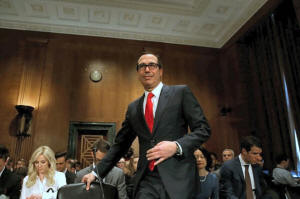|
Treasury's Mnuchin concerned about
alternate scoring models of Trump tax plan
 Send a link to a friend
Send a link to a friend
 [May 19, 2017]
By Lindsay Dunsmuir [May 19, 2017]
By Lindsay Dunsmuir
WASHINGTON (Reuters) - U.S. Treasury
Secretary Steven Mnuchin told lawmakers on Thursday that he has some
doubts that what are known as alternate scoring models will give enough
credit to the potential for economic growth when assessing the impact of
the Trump administration's tax plan.
In late April, the administration put out a one-page overview of its tax
reform plans, which would cut taxes for businesses to 15 percent, as
well as cutting taxes and simplifying income tax brackets for
individuals. Critics questioned how the tax cuts would be offset without
driving up the federal deficit.
"What I have said repeatedly is that any plan we put forward we believe
should be paid for with economic growth," Mnuchin told the Senate
Banking Committee. "I am concerned as to whether some of the models will
attribute enough growth in dynamic scoring but when we present the
details we will present how we think it should be paid for."
Mnuchin has said the April plan was deliberately vague in order to allow
the White House to more effectively work with lawmakers to come up with
a joint agreement that could pass Congress.

How to pay for the tax cuts remains a sticking point. Fiscal
conservatives in the Republican-controlled Congress would strongly
prefer a revenue-neutral plan as they are against increasing deficits.
Mnuchin has said the cuts would pay for themselves under a dynamic
scoring model analysis, which takes into account the effect of tax
changes on economic growth and revenue.
At Thursday's hearing, Mnuchin was also peppered by Democrats on the
committee about details of the tax plan, including whether or not cuts
would mostly benefit the wealthy.
[to top of second column] |

U.S. Treasury Secretary Steven Mnuchin arrives with his fiance
Louise Linton at hearing on Domestic and International Policy Update
before the Senate Banking Committee on Capitol Hill in Washington,
DC, U.S. May 18, 2017. REUTERS/Yuri Gripas

"I can assure you the president's objective and my objective is we
create a middle income tax cut and we do not raise taxes on the middle
income, if anything the opposite," Mnuchin said.
He added that the plan would get rid of almost every single tax
deduction, which he said were disproportionately used by the wealthy and
that the aim was that 95 percent of Americans would no longer need to
itemize deductions.
Later on Thursday at a U.S. Chamber of Commerce event, the Treasury
secretary insisted that tax reforms remain on track despite growing
doubts among investors on the size and scope of any cuts achievable in
Congress.
A renewed push on a repeal of Obamacare is currently being worked on in
the Senate while reports that President Donald Trump may have tried to
interfere with a federal investigation has shifted focus away from the
congressional agenda.
"I am still very hopeful that we'll get tax reform done this year,"
Mnuchin said.
[© 2017 Thomson Reuters. All rights
reserved.]
Copyright 2017 Reuters. All rights reserved. This material may not be published,
broadcast, rewritten or redistributed.
 |